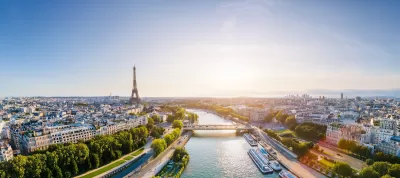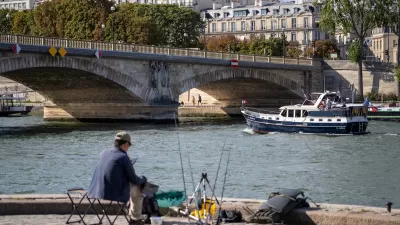The Paris Olympics will highlight the renaissance of the city’s famous river.

According to an article by Stefano Lupieri in World Crunch, “the [River] Seine will undoubtedly be one of the stars of the ceremony” at the upcoming Paris Olympics. “From the Olympic village built on the banks of the Saint-Denis and Saint-Ouen rivers to the open-water swimming events, the Seine's presence was a decisive factor in the triumph of Paris' candidacy” and highlights recent efforts to clean and revitalize the river.
Riverbank residents will soon be able to bathe in it again, thanks to the major clean-up work carried out in the run-up to the Olympic Games, and all the economic players will become increasingly aware of the untapped potential of river transport in a time of ecological transition.
The river also played a role throughout preparations, as river freight was heavily used for construction materials to reduce carbon emissions from trucks. This reflects a controversial movement to expand the greater Paris metro to the coast, a proposal opposed by regional officials. But a new plan called the Seine Axis Agreement “wants to focus on the valley's touristic and cultural potential, which is just as under-exploited as river freight.”
The Seine has its problems, too. “According to a study carried out by the Ecole Nationale Supérieure de Paysage (ENSP Versailles) and funded by the CPIER, the banks of the Seine ‘have been degraded by decades of neglect,’” requiring investment and redevelopment.
FULL STORY: The Real Splash At Next Year's Paris Olympics? The River Seine, Reimagined

Planetizen Federal Action Tracker
A weekly monitor of how Trump’s orders and actions are impacting planners and planning in America.

Maui's Vacation Rental Debate Turns Ugly
Verbal attacks, misinformation campaigns and fistfights plague a high-stakes debate to convert thousands of vacation rentals into long-term housing.

Restaurant Patios Were a Pandemic Win — Why Were They so Hard to Keep?
Social distancing requirements and changes in travel patterns prompted cities to pilot new uses for street and sidewalk space. Then it got complicated.

In California Battle of Housing vs. Environment, Housing Just Won
A new state law significantly limits the power of CEQA, an environmental review law that served as a powerful tool for blocking new development.

Boulder Eliminates Parking Minimums Citywide
Officials estimate the cost of building a single underground parking space at up to $100,000.

Orange County, Florida Adopts Largest US “Sprawl Repair” Code
The ‘Orange Code’ seeks to rectify decades of sprawl-inducing, car-oriented development.
Urban Design for Planners 1: Software Tools
This six-course series explores essential urban design concepts using open source software and equips planners with the tools they need to participate fully in the urban design process.
Planning for Universal Design
Learn the tools for implementing Universal Design in planning regulations.
Heyer Gruel & Associates PA
JM Goldson LLC
Custer County Colorado
City of Camden Redevelopment Agency
City of Astoria
Transportation Research & Education Center (TREC) at Portland State University
Jefferson Parish Government
Camden Redevelopment Agency
City of Claremont




























